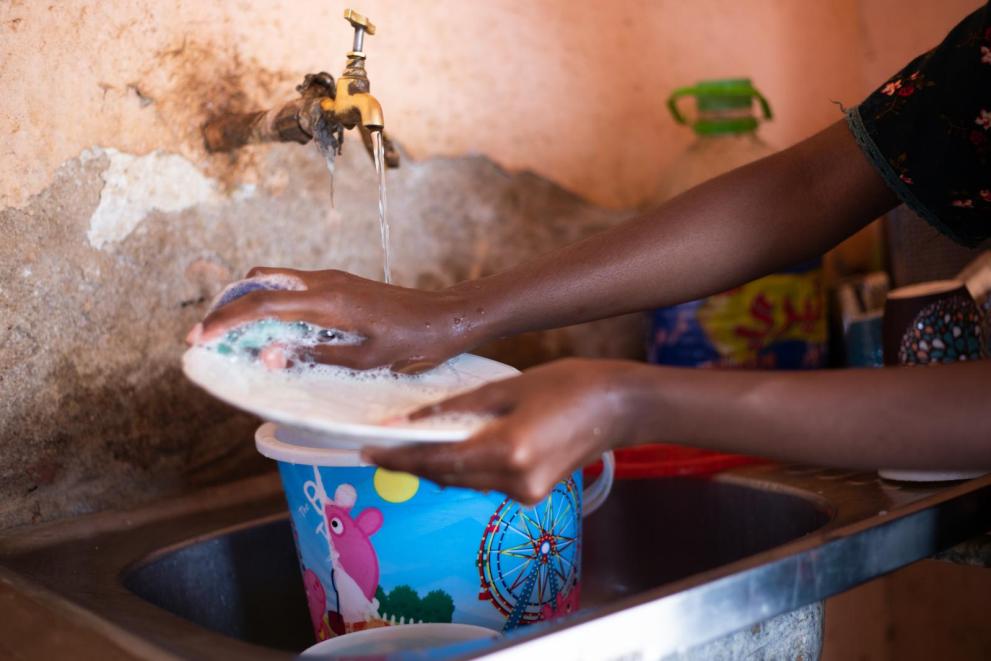
‘We do not have the exact figures, but most domestic workers in Sudan are irregular migrants and have no work permit,’ says Salwa Mohamed from the Sudanese Ministry of Labour and Social Development. Statistics from the International Labour Organization (ILO) show that there are 67 million domestic workers worldwide, a number that is increasing steadily. 80% of these are female.
This also reflects the case of Sudan. The country is a major destination for migrants and hosts approximately 1.2 million migrants (United Nations, 2019). Many travel without a visa or valid papers, looking for work. ‘Because most of them have no regular status, they are vulnerable and at risk of facing economic exploitation and physical abuse,’ Ms Mohamed adds.
This also happened to Selam (real name withheld), who migrated from Ethiopia to Sudan in search of a job. She was fooled by a broker and ended up without official documents in a household in Khartoum where her employers overworked and abused her.
The reasons migrant women experience such treatment are diverse. A study conducted by the Sudanese Organization for Research and Development (SORD) on female migrant domestic workers in Khartoum concluded that the vulnerability of this group is increased by poverty, illiteracy, their young age, and their irregular status in Sudan. Currently, the Ministry of Labour is working with SORD and the Ethiopian Community Association (ECA) on solutions to prevent exploitation and to protect migrant domestic workers.
Information is key
‘Information is what domestic workers need most,’ says Negasi Teferi, a member of ECA in Khartoum. ‘They have no idea where to go and how they can get help. Sometimes these people, especially women, suffer and end up traumatised.’ ECA supports vulnerable migrants and victims of human trafficking from Ethiopia. The association runs a safe house, where medical care, psychosocial support and vocational training are provided as well as assistance with voluntary return to Ethiopia. ‘Selam’s story is similar to that of many other migrants who have no professional working skills,’ says Mr Teferi. He met her one day at the safe house where she had been sent by a fellow Ethiopian domestic worker to seek help. She was 26 when she lost her father and was taken in by the promises of an Ethiopian broker to get her an easy job with good wages as a domestic worker in Sudan. ‘Brokers and smugglers take advantage of the situation of such girls, taking their money and even sexually abusing them,’ explains Mr Teferi. ‘The bait is always the promise of official working papers, but they never materialise.’ He adds: ‘Currently, we are working with the Ministry of Labour on a communication strategy to prevent forced labour and to inform domestic workers about services available to them. This is vital for victims like Selam.’
Revision of laws and regulations
‘We are also working on legal opportunities with the parties concerned and civil society organisations and revising the Sudanese Domestic Workers Act to bring it into line with international standards,’ remarks Salwa Mohamed. She represents the the Ministry of Labour in the National Committee for Combating Human Trafficking (NCCT) which coordinates migration-related issues with all relevant actors in Sudan. Among other objectives, the committee aims to ensure a decent work environment and offer protection to domestic workers. In addition to the legislative measures needed, the establishment of a referral system is planned to direct domestic workers to appropriate services, such as shelters, legal aid, support in navigating bureaucratic processes and voluntary return.
‘Organisations such as the Ethiopian Community Association are key for the referral system in Khartoum,’ observes Ilham Ibrahim from SORD, which has been identifying and mapping organisations that serve the purposes of the referral system. ‘We also support all partner organisations in improving their services,’ she says, adding that ‘we are working closely with the Ministry of Labour to address all the challenges that migrant domestic workers face, aiming to establish a legal status and a set of laws and regulations that protect domestic workers, for example.’
Provision of services
The process of establishing the referral system is driven by the Ministry of Labour. ‘On behalf of the government, we facilitate the work of all the organisations and institutions involved,’ explains Salwa Mohamed. ‘We have offices in every Sudanese state to receive and work on the complaints of domestic workers. The research carried out by SORD and information from our regional offices are helping us to work on solutions together with all the ministries involved,’ she says, adding that the issue of domestic workers is one of their priorities at the Ministry of Labour because irregular immigrant domestic workers are among the most vulnerable and abused groups.
Selam received eight months of vocational training at the ECA safe house and was assisted in returning to her country voluntarily. Back home in Ethiopia, she was reunited with her family and is now running her own leather crafts business that keeps food on her family’s table.
Background
Better Migration Management (BMM) is supporting the Sudanese Government in establishing and operating a referral system for vulnerable migrants to increase protection for them, especially victims of forced labour. BMM has developed an action plan in cooperation with the Ministry of Labour and Social Development, ECA and SORD. It also supported the study on domestic workers conducted by SORD and is working to improve the capacities of service providers and increase access to information for domestic workers. BMM is financed by the European Union through the EU Trust Fund for Africa and the German Federal Ministry of Economic Cooperation and Development (BMZ). The overall objective of BMM is aims to improve the safe, orderly, regular management of migration flows within the Horn of Africa.by applying a human rights-based approach.
Details
- Publication date
- 21 September 2020
- Region and Country
- Sudan
- Thematic
- Greater economic and employment opportunities
- Partner
- GIZ
